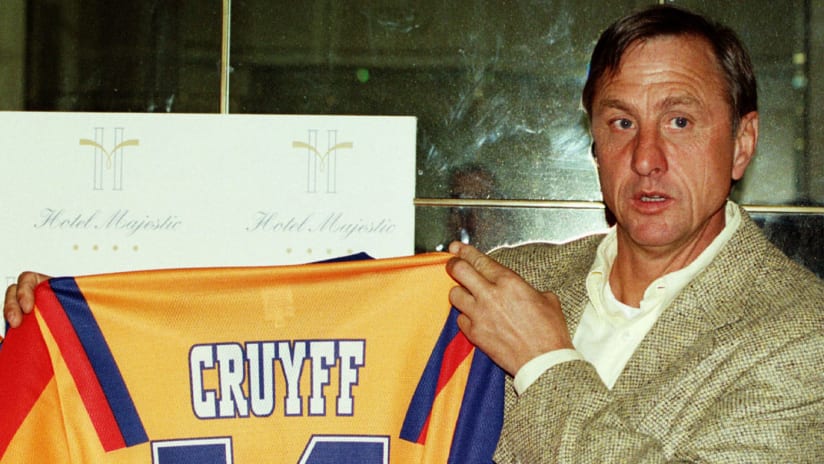Johan Cruyff died today, one month and one day shy of his 69th birthday, of lung cancer. If you love the beautiful game; if you love the idea that aesthetics matter; if you are a fan of incremental improvement and application of applied principles over time in order to create something remarkable, then today you should mourn.
Cruyff was, is, and probably always will be the greatest player in the history of his hometown club, Ajax Amsterdam, and led them to three straight Champions League wins (1971, '72 and '73). He's the man that saved Barcelona from a decade-long downward slide in the 1970s, winning his third Ballon d'Or with the Catalonian giants after collecting his first two with Ajax. He had time, in 1979, to win the old NASL MVP award while playing for the LA Aztecs. He's also the enduring symbol of the Dutch national team, even as they continue to turn away from the stylistic principles that made them every neutral's favorite in the 1970s and into the 1980s. He won the 1974 FIFA World Cup Golden Ball, awarded to the tournament's best player, even though Holland didn't win the Cup itself.
And his individual wizardry is memorialized any time we see a Cruyff Turn:
Today, we lost a legend. We'll never forget Johan Cruyff (1947-2016) & his patented turn. https://t.co/8Wz9jluWaK
— Major League Soccer (@MLS) March 24, 2016
And it is a measure of how influential and accomplished and ground-breaking he was that, even if he'd never done any of that stuff on the field, we'd still be publicly mourning Cruyff today. Making a list of the greatest managers ever? He belongs on it for what he accomplished at Barcelona from 1988 through 1996, producing one of the best teams ever -- the "Dream Team" that won La Liga four times in a five year span, as well as the club's first Champions League title -- and one that flouted the "defense first" convention of that particular era.
He was also the greatest aphorist in the the game's history. Just Google "Cruyff quotes" and you'll come up with over 133,000 hits. My own personal favorite:
"Technique is not being able to juggle a ball 1000 times. Anyone can do that by practicing. Then you can work in the circus. Technique is passing the ball with one touch, with the right speed, at the right foot of your team mate."
Or actually, maybe it's this one:
"Choose the best player for every position, and you’ll end up not with a strong XI, but with 11 strong 1’s."
I wish I had written those lines. I crib them all the time when flailing to make a point in this particular column.
But even if he had done none of the above, we'd still be mourning Cruyff, because he was the catalyst behind the evolution of the academy model in modern soccer, creating the foundation upon which the modern game has grown. He himself was a product of the Ajax academy in the early 1960s, playing his way from the youth teams into the senior squad by the time he'd turned 17. Youth systems had existed, and he was proof that they worked.
He made them essential, however, when he convinced the Barcelona president to found La Masia. Cruyff was the driving force behind finding grassroots talent and coupling it with top-down instruction, philosophy and integration. He had the vision to push for a system that builds upon itself, and because of it, Barcelona have reaped greater rewards than any other club.
"Home grown players form the foundation of any team; they have commitment and that identification with the club that other players don't have," one of La Masia's greatest products, Xavi, told UEFA.com in 2009. "I think it's always important to have at least five or six players who have come through the youth system. In short, that's La Masia's way."
And that's the way almost every other team is trying to emulate. It's certainly the way most MLS teams are heading, and the reason we fete Oscar Pareja's penchant for promoting academy kids to the FC Dallas first team, or why we cheer Sporting CEO Robb Heineman's statement that the goal "isn't to import 11 Messis; it's to field a team of Messis from in and around Kansas City, who came up through our academy."
You get the idea, even if that particular dream is impossible -- after all, there is only one Lionel Messi.
Messi, of course, wouldn't exist without Cruyff, and neither would Heineman's dream. Our game didn't just lose a legend and a champion; it lost a visionary who, more than anyone else, changed the parameters of and path to success.
That's why you should mourn.
Sweden’s Jan Olsson pays tribute to Johan Cruyff, his great tormentor https://t.co/hTqH4CsOjdhttps://t.co/n5ZC53Y1eO
— Guardian sport (@guardian_sport) March 24, 2016













